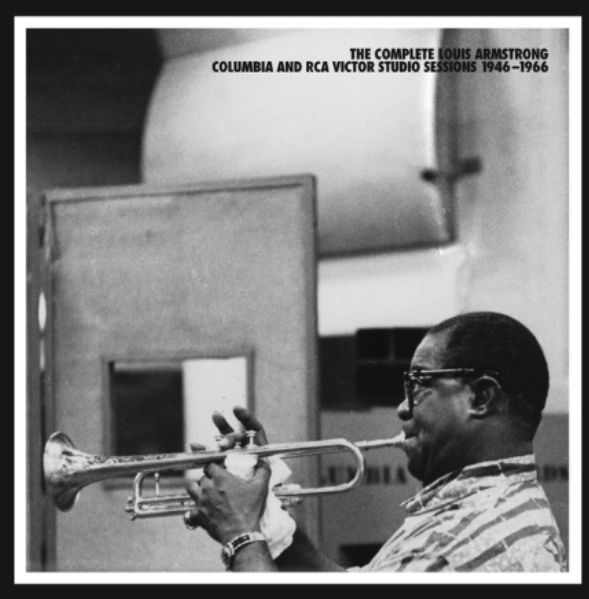
.jpg)

Complete Louis Armstrong Columbia & RCA Victor Studio Sessions 1946-66

Label: Mosaic
Year: 1961
Released on LP: No
Released on CD: Yes
Tracks
Disc VI
Satch Plays Fats (Alternates) And The Real Ambassadors (Master LP)
1. Nomad
2. You Swing Baby (The Duke)
3. Lonesome
4. Nomad (-10)
5. Lonesome
6. Lonesome
7. Everybody's Comin'
8. Cultural Exchange
9. Good Reviews
10. Good Reviews
11. Remember Who You Are
12. Summer Song
13. King For A Day
14. Blow Satchmo
15. The Real Ambassador
16. The Real Ambassador
17. One Moment Worth Years
18. They Say I Look Like God
19. They Say I Look Like God
20. I Didn't Know Until You Told Me
21. Swing Bells
22. Blow Satchmo
23. Finale
Disc V11
The Real Ambassadors (Singles And Alternates)
1. Nomad
2. You Swing Baby (The Duke)
3. Lonesome
4. Nomad
5. Lonesome (1st Version)
6. Lonesome (2nd Version)
7. Everybody's Comin'
8. Cultural Exchange
9. Good Reviews
10. Good Reviews
11. Remember Who You Are
12. Summer Song
13. King For A Day
14. Blow Satchmo
15. The Real Ambassador
16. The Real Ambassador
17. One Moment Worth Years
18. They Say I Look Like God
19. They Say I Look Like God
20. Since Love Had Its Way
21. I Didn't Know Until You Told Me
22. Swing Bells
23. Blow Satchmo
24. Finale
Notes
Personnel
Dave Brubeck (piano)
Joe Morello (drums)
Eugene Wright (bass)
Louis Armstrong (vocals)
Carmen McRae (vocals)
Lambert, Hendricks & Ross (vocals)
Joe Darensbourg (clarinet)
Trummy Young (trombone,vocals)
Irving Manning (bass)
Danny Barcelona (drums)
Howard Brubeck (tubular chimes)
Billy Kyle (piano)
Reviews
London Jazz News ©
Review by Leonard Weinreich - extract
The Real Ambassadors
In 1961, Armstrong works on his last album for Columbia, possibly one of the more surprising and unconventional of his extraordinary career. The title is The Real Ambassadors, a jazz musical suggesting that a nation’s best ideals are more truthfully expressed by its artists and jazz musicians, rather than politicians and officials.
Here’s the background: during the end of the 50s, the U.S. State Department, waking to the fact that the foreign appetite for U.S. jazz is insatiable, decides to use it as Soft Power to influence developing countries. Louis Armstrong and the All Stars are despatched on a worldwide tour. Then Dave Brubeck’s Quartet is exported soon after. Brubeck is no bigot. He rejects a lucrative Southern tour with his refusal to replace his bass player Eugene Wright with a white musician. His response to his State Department trip highlights the hypocritical irony of representing a country whose policies, both foreign and domestic, don’t represent him. The Real Ambassadors is written by the husband-and-wife team, Dave and Iola Brubeck (lyrics: Iola; music: Dave), addressing the issues as best they can: musically. This, at a time when Brubeck is the hottest box office attraction in jazz and therefore able to exercise considerable control over his album material.
Inspired by Armstrong’s answer to a question posed on a TV show: “I think you’re wrong about me being the ambassador. I think JAZZ is the ambassador”, the Brubecks write the show around him. Five years later, in 1961, they’re offered a window in the ever-peripatetic Armstrong’s crowded schedule: five recording sessions only. They seize the opportunity, welcoming the unrefusable offer because it may be unrepeatable. However, once in the studio, the strictly rationed time means it’s only possible to record half the score. The Real Ambassadors is only performed live once, at the Monterrey Jazz Festival.
All the studio takes are here, the bits that worked and even those that didn’t. Like most musicals, it has some memorable tunes and flurries of witty lyrics. But no musical ever has a diamond-studded cast so well suited to the material: Louis Armstrong as hero, supported by Dave Brubeck (without Paul Desmond) and stellar voices, Carmen McRae, and Lambert, Hendricks & Ross. All supervised by renowned producer, Teo Macero, and recorded in sumptuous mid-century sound.
Definitely worth a listen although, inevitably, as with most musicals, patches of the score are creaky (this reviewer is uneasy around preachiness), but the cast adds professionalism and passion available nowhere else. High points abound: Armstrong’s warm delivery of ‘Summer Song’; and ironic implications in ‘Cultural Exchange’ with lines like: “the State Department has discovered jazz,/it reaches people like nothing ever has”.
Carmen McRae assumes full charge of ‘Good Reviews’, ‘In The Lurch’ and ‘My One Bad Habit’, duetting with Armstrong on ‘I Didn’t Know Until You Told Me’ and ‘One Moment Worth Years’ (with ultra-sensitive support from Brubeck). Lambert, Hendricks & Ross apply their hipness to the title song, ‘The Real Ambassadors’ (and their warp-speed virtuosity in the second chorus). Plus, three unissued songs that didn’t make the final cut: ‘Nomad’, ‘You Swing Baby’, (a.k.a. ‘The Duke’) and ‘Lonesome’.
It’s a fascinating period piece and social document immaculately expressed in jazz terms by a brilliant combination of unlikely musicians. Perhaps for some future generation, The Real Ambassadors will be vital in decoding the beginning of the 60s.
In short, the entire collection is an intoxicating cocktail of profundity and joy.